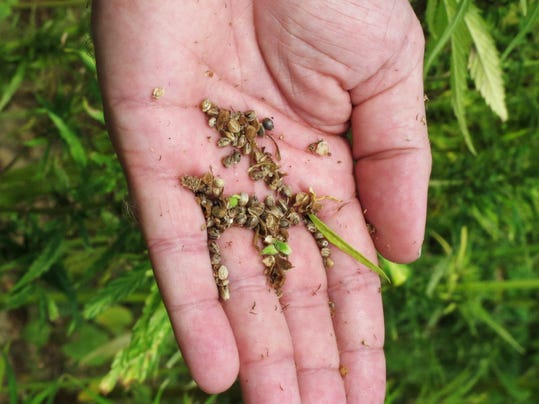MURRAY, Ky. (AP) — Call it a homecoming for hemp: Marijuana’s non-intoxicating cousin is undergoing a rebirth in a state at the forefront of efforts to reclaim it as a mainstream crop.
Researchers and farmers are producing the first legal hemp crop in generations in Kentucky, where hemp has turned into a political cause decades after it was banned by the federal government. Republican U.S. Sens. Mitch McConnell and Rand Paul advocate for it, as does state Agriculture Commissioner James Comer, a Republican who is running for governor next year.
The comeback is strictly small scale. Experimental hemp plots more closely resemble the size of large family gardens.
Statewide plantings totaled about 15 acres from the Appalachian foothills in eastern Kentucky to the broad stretches of farmland in the far west, said Adam Watson, the Kentucky Agriculture Department’s hemp program coordinator.
The crop’s reintroduction was delayed in the spring when imported hemp seeds were detained by U.S. customs officials. The state’s Agriculture Department sued the federal government, but dropped the case Friday after reaching an agreement on importing the seeds into Kentucky. The seeds were released after federal drug officials approved a permit.
Since then, test plots have shown the crop to be hardy and fast growing — and a potential moneymaker with a remarkable range of traditional uses including clothing, mulch, hemp milk, cooking oil, soap and lotions.
“What we’ve learned is it will grow well in Kentucky,” Comer said. “It yields a lot per acre. All the things that we predicted.”
At Murray State University, about 180 miles southwest of Louisville, plants have sprouted to at least 8 feet tall, turning a shade of green and yellow as they reach maturity. Harvest is approaching.
“It’s had a good growth period,” said Murray State agriculture dean Tony L. Brannon. “It appeared to tolerate the extremes in weather from extremely wet to extremely dry pretty well.”
Hemp’s roots in Kentucky date back to pioneer days and the towering stalks were once a staple at many farms.
“We’ve got an excellent climate for it, excellent soils for it,” Watson said. “It’s a good fit for Kentucky producers. The ultimate question is going to come down to economics. Is there a market and can Kentucky capture that?”
Growing hemp without a federal permit was banned in 1970 due to its classification as a controlled substance related to marijuana. Hemp and marijuana are the same species, Cannabis sativa, but hemp has a negligible amount of THC, the psychoactive compound that gives marijuana users a high.
Legal production of the crop has been gone for so long that it was a virtual blank slate in modern Kentucky agriculture.
Teams of researchers and farmers are studying which seed varieties and soil types are best suited and how much moisture or fertilizer are needed.
“There are a lot of unknowns,” Watson said. “It’s those sorts of answers that producers are going to need before they can turn it into an economically viable crop on their farms.”
For now, growing hemp is strictly limited. The federal farm bill enacted this year restricts hemp production to research projects designated by agriculture departments in states that allow the crop to be grown. But commercial uses are also emerging.
Fifteen states have removed barriers to hemp production, according to Vote Hemp, a group that advocates for the plant’s legal cultivation.
Licensed growers were able to secure seeds in three states — Kentucky, Colorado and Vermont — the group said, but difficulties in obtaining seeds limited production. According to Eric Steenstra, president of Vote Hemp, the biggest obstacle was gaining approval from the Drug Enforcement Administration to import hemp seeds for planting.
In Vermont, about 12 farms registered to grow hemp, said Alison Kosakowski, a spokeswoman for the state’s Agency of Agriculture, Food, and Markets. The agency doesn’t know how many producers ended up planting a hemp crop.
The intentions were much bigger in Colorado. There were 56 registrations for commercial hemp production and 76 more for research and development, according to Ron Carleton, the state’s deputy agriculture commissioner.
Unavailability of seed likely kept “a fairly significant” number of applicants from getting hemp in the ground, he said. Some farmers able to produce a crop this year may harvest the seeds to grow next year’s crop, he said.
In Kentucky, the crop is being studied by researchers at a half-dozen universities.
Eastern Kentucky University researchers recently harvested their small hemp plot. Those plants reached 7 feet tall.
“It seems to be fairly easy to grow,” said EKU agriculture professor Bruce Pratt. “The plants got established so quickly that they shaded out the weeds.”
A 2013 report by the Congressional Research Service pegged hemp imports at $11.5 million in 2011, a tiny sum relative to other imported crops.
If widespread U.S. production is someday allowed, states able to attract processors close to where the crop is grown will be the winners, said University of Kentucky agricultural economist Will Snell.
“It’s a small, niche market, but it’s growing,” he said. “We can grow it. The problem is, other states and other countries can grow it as well.”


